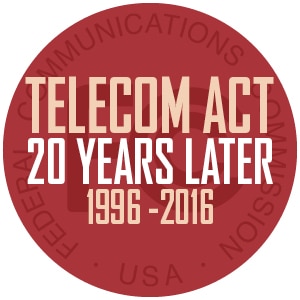
The debate rages on to this day. There are those that believe deregulation and consolidation ruined radio, homogenized its sound and killed jobs. Others still argue that more deregulation is needed and national scale is important for radio to compete with more competition for the eyes and ears of the consumer than ever before. There is one important point that seems to get overlooked when debating 1996. That is that there were a great many radio stations in financial peril. They were all over America and they were barely surviving. The Telecom Act enabled a lot of those stations to be sold and bundled into clusters where expenses could be reduced and signals saved.
The Telecommunications Act certainly took on a life of its own when passed and that meant a flurry of deals, perhaps many of them overpriced, and a good number of people who were able to walk away with a decent amount of spending money. Others stayed in the game and built bigger companies. The selling and buying continued at a frantic pace for as long as the economy would allow. Once approved by Congress and instituted by the FCC, the Act drastically changed the number of radio stations companies could own. Where previously one company could own 20 AM’s and 20 FM’s nationally, those caps were eliminated. And companies were allowed to own up to eight stations per market.
In every issue of Radio Ink in 2016 we’ll be looking back at that historic piece of legislation that altered the radio industry forever. We’ll be interviewing all the major players who had a front seat to history. Our first interview is with Reed Hundt, who was the chairman of the FCC at the time the Telecommunications Act was passed. It was his Commission’s job to set it in motion. And while radio was just a small portion of the legislation that deregulated many industries, we focused our questions with the former chairman on radio. Here’s an excerpt from that interview.
RI: What was the reason radio was included in the 1996 Telecom Act?
Hundt: Radio, specifically, was included for a reason that is absolutely unique to radio, which is this: a handful of companies wanted to buy many, many radio stations. They did not like it that the existing rules did not allow them to buy a lot of stations. So radio went to the FCC and said, “We want to build very large, national radio networks. We want you to tell the FCC that they can’t stop us.” So the radio titans had a dinner meeting with me in New Orleans and they told me this was the way it was going to be. This was at the NAB Radio Convention in the winter of 1995-6. It was Lowry Mays and others, about five or six of the titans in radio. I said, “Well, this consolidation is in the opposite direction of everything else that’s in the bill that’s being negotiated.” They said, fine, but we want it our way and we’ve convinced the Newt Gingrich House Representatives to do it our way. And I said, “Well, I don’t like it. I think you’re making a big mistake. I think it’s going to hurt the quality of radio and it’s going to hurt content and it’s going to hurt the country, and I don’t even know that it will work out for you guys.” And they said, “We are just politely telling you. It’s really none of your business. Congress is going to tell you to do whatever we want.” And that’s what happened with radio. The radio people cut their special deal with Gingrich.
RI: What did you think at the time should have been the right thing to do? Just leave it the way it was or was there some modified plan you thought might have worked?
Hundt: I went to the Department of Justice and I said, “The radio guys are over-consolidating and they’re building regional and local oligopolies. This is bad for content and bad for consumers.” The Department of Justice agreed with me, but the law was very, very explicit and there was very little that the Department of Justice or the FCC could do. The problem is, it was bad luck for the buyers. They were buying at a time when the markets were soaring in 1996, 97, 98, 99. They were overpaying. Then we got to 2000 and 2001 and the stock market asset prices began to decline and they borrowed too much money and bought too much and they ran into a whole bunch of trouble. Like I said, you can’t predict. They got what they asked for.






